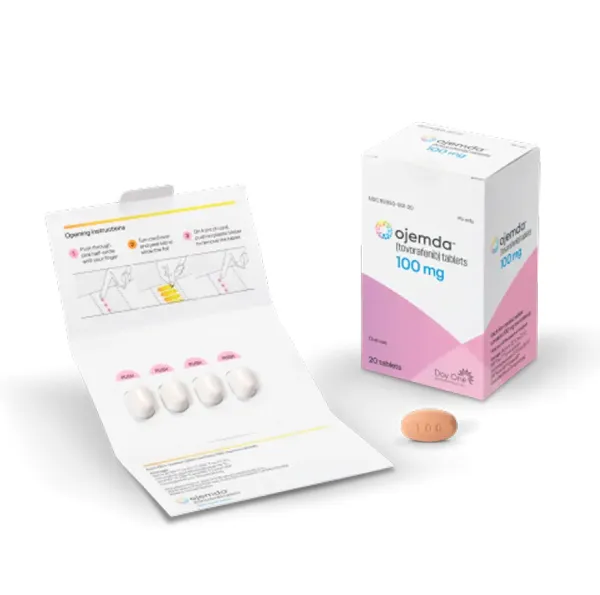Generic Ojemda Availability
Last updated on Sep 10, 2025.
Ojemda is a brand name of tovorafenib, approved by the FDA in the following formulation(s):
OJEMDA (tovorafenib - for suspension;oral)
-
Manufacturer: DAY ONE BIOPHARMS
Approval date: April 23, 2024
Strength(s): 25MG/ML [RLD]
OJEMDA (tovorafenib - tablet;oral)
-
Manufacturer: DAY ONE BIOPHARMS
Approval date: April 23, 2024
Strength(s): 100MG [RLD]
Is there a generic version of Ojemda available?
No. There is currently no therapeutically equivalent version of Ojemda available in the United States.
Note: Fraudulent online pharmacies may attempt to sell an illegal generic version of Ojemda. These medications may be counterfeit and potentially unsafe. If you purchase medications online, be sure you are buying from a reputable and valid online pharmacy. Ask your health care provider for advice if you are unsure about the online purchase of any medication.
See also: Generic Drug FAQ.
Related patents
Patents are granted by the U.S. Patent and Trademark Office at any time during a drug's development and may include a wide range of claims.
-
Pharmaceutical formulations of a pan-RAF kinase inhibitor and processes for their preparation
Patent 10,426,782
Issued: October 1, 2019
Inventor(s): Brake Rachael L. & Bozon Viviana & Chow Ching-Kuo J. & Dinunzio James C. & Galvin Katherine M. & Kannan Karuppiah & Kodono Yuki & Xu Qunli
Assignee(s): MILLENNIUM PHARMACEUTICALS, INC.The invention relates to a pharmaceutical composition comprising Compound 1 or a pharmaceutically acceptable salt thereof for the treatment of cancer and a process for its preparation. The invention also relates to administering the pharmaceutical composition to a patient according to an intermittent dosing regimen.
Patent expiration dates:
- June 23, 2035✓
- June 23, 2035
-
Compounds useful as Raf kinase inhibitors
Patent 8,293,752
Issued: October 23, 2012
Inventor(s): Chen; Weirong et al.
Assignee(s): Millennium Pharmaceuticals, Inc. (Cambridge, MA); Sunesis Pharmaceuticals, Inc. (South San Francisco, CA)The present invention provides compounds useful as inhibitors of Raf protein kinase. The present invention also provides compositions thereof, and methods of treating Raf-mediated diseases.
Patent expiration dates:
- August 4, 2031✓✓
- August 4, 2031
Related exclusivities
Exclusivity is exclusive marketing rights granted by the FDA upon approval of a drug and can run concurrently with a patent or not. Exclusivity is a statutory provision and is granted to an NDA applicant if statutory requirements are met.
Exclusivity expiration dates:
- April 23, 2029 - NEW CHEMICAL ENTITY
- April 23, 2031 - TREATMENT OF PATIENTS 6 MONTHS OF AGE AND OLDER WITH RELAPSED OR REFRACTORY PEDIATRIC LOW-GRADE GLIOMA (LGG) HARBORING A BRAF FUSION OR REARRANGEMENT, OR BRAF V600 MUTATION
More about Ojemda (tovorafenib)
- Check interactions
- Compare alternatives
- Pricing & coupons
- Drug images
- Side effects
- Dosage information
- During pregnancy
- FDA approval history
- Drug class: multikinase inhibitors
- En español
Patient resources
Professional resources
Related treatment guides
Related/similar drugs
Glossary
| Term | Definition |
|---|---|
| Drug Patent | A drug patent is assigned by the U.S. Patent and Trademark Office and assigns exclusive legal right to the patent holder to protect the proprietary chemical formulation. The patent assigns exclusive legal right to the inventor or patent holder, and may include entities such as the drug brand name, trademark, product dosage form, ingredient formulation, or manufacturing process A patent usually expires 20 years from the date of filing, but can be variable based on many factors, including development of new formulations of the original chemical, and patent infringement litigation. |
| Drug Exclusivity | Exclusivity is the sole marketing rights granted by the FDA to a manufacturer upon the approval of a drug and may run simultaneously with a patent. Exclusivity periods can run from 180 days to seven years depending upon the circumstance of the exclusivity grant. |
| RLD | A Reference Listed Drug (RLD) is an approved drug product to which new generic versions are compared to show that they are bioequivalent. A drug company seeking approval to market a generic equivalent must refer to the Reference Listed Drug in its Abbreviated New Drug Application (ANDA). By designating a single reference listed drug as the standard to which all generic versions must be shown to be bioequivalent, FDA hopes to avoid possible significant variations among generic drugs and their brand name counterpart. |
Further information
Always consult your healthcare provider to ensure the information displayed on this page applies to your personal circumstances.

